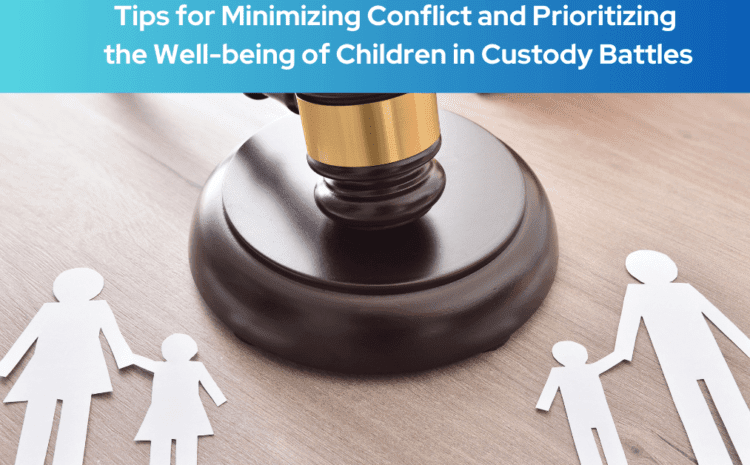
In the midst of divorce debates children confront the most challenging situation of maturing emotionally beyond their measure as their wounds remain inflict extensive agony even after the judicial verdict. The children are the most troubled during separation and divorce which occurs within families. Since the parents are unstable and fight among themselves, the sadness and confusion that befall these kids are extreme. However, the kids are seldom aware of this situation of unwanted usage of them by one parent or the other to make the deals targeted at their personal goals. In the conditions mentioned it also often happens that the agreements that are made do not provide for the highly damaging emotional, social, and psychological detriment that the children have to endure.
The Supreme Court, in the famous 2013 case of Gaurav Nagpal vs. Sumedha Nagpal, explained how the best interests of a child represent the paramount feature of custodial arrangements, which must be taken into consideration in every single such case. While courts consider different factors including the desires of the child and their age as well as the capabilities of the parents to mold these interests for their children’s best, they thus come to a decision. This present article is designed to provide exhaustive information to children’s parents that find themselves in the divorce battle arena, as it will throw light on the prevailing laws, court decisions and also reveal how to limit conflict and protect the welfare of the children.
Issues Regarding Well-Being of Children
The welfare theory hangs by the fact that its application brings up ambiguities because the principle takes shape vaguely and sadly a lack of clarity from appellate judicial decisions. Like when judges are to look at certain factors with the purpose of determining who the child’s best interest lies with, these judges usually end up resorting to their individual preferences or other considerations in the case that are subjective. Likewise, there have been unsolved problems about the precise role of the parents’ income in the court-approved decisions. It is these discrepancies given to judges in the light of welfare principle that makes judicial officers to sideline some vital issues in decision-making.
In order to counter this problem, jurisdiction over such matters has to be equipped with a list of criteria that would define the welfare standard accounting for possible interventions of the parties involved in the decision making. Primarily the main idea to which a child’s custody dispute should be in focus is assessment of the child’s best interest. Child custody should be the parent who can better meet the cognitive, physical as well as educational, social and healthcare needs of their child as they grow young. This principle is based on the idea that the whole child can only achieve their full potential in an arrangement that is safe and enabling.
How to Make Custody Battle Less Stressful for your Child
In India, the custody of a child in case of divorce or separation is dictated by laws such as the Guardians and Wards Act, 1890, and the Hindu Minority and Guardianship Act, 1956. The Hindu girl will be taken care of by her father in the absence of her mother until the latter returns from the exile. It is also the responsibility of the custodial parent to carry out the court-approved arrangements in a manner that upholds the wellbeing of the child. While mothers are usually custodians of minors below the age of five years due to ancient norms and assumptions of good maternal care, the court tries to cater for all parties involved. This law, based upon the legal system, in most cases, has patriarchal emphasis and assumes that the best parents for small children is the mother. This distinction, however, adds to this complication as it is an added factor that jurists have to handle to get to the crux of these matters.
Despite the question of gender being a big thing, the principal parent’s capability to offer and support a minor child with daily activities should have a greater effect on the decision-making process rather than the gender. An instance of this is where the father shows to the court that he can provide things like education, resources and health care which in turn could be better than what the mother can provide. In such a case, custody would be given to him. When it comes to the Tejaswini Gaud vs. Shekhar Jagdish Prasad Tiwari case, the Court leaves it yet clear that the well being of the child is of the prime concern by citing various factors responsible for it including upbringing, the economical ability of guardian and the holistic well being of the child in terms of emotions, health and education.
The attitude towards the mental and physical that contain the welfare of the child along with each parent’s well-being and the relation of the child with each parent concerning the other significant people in their life like brother/sister and extended family members will also affect the determination of child’s welfare and not only that. This too goes beyond just understanding each partner’s responsibility and ability to be a reliable child care provider but also touches on their involvement in maintaining the child’s relationships. In the same vein, it should be underscored that the facts listed are not extensive, and as required courts may look into other circumstance(s).
Furthermore, if a child demonstrates sufficient competence and maturity, their preference in custody matters may be taken into account. For example, if a child expresses a desire to live with their mother and is deemed mature enough to make such a decision, custody may be awarded to the mother.
Tips for Minimizing Conflicts
1.Communication and Cooperation
It is important for the parents to sustain the communication and to keep their behavior empathic, be guided by the interests of the child, and not by their personal resentment or rancor. Because shared co-parenting helps to reduce strains and strengthen the bond between parents and kids, it can be an indispensable tool to promote healthy relationships. The example of Shilpa Aggarwal and Aviral Mittal presents collaborative ways as the most effective way in custody fights, demonstrating how constructive conversation can yield a good outcome for all involved people.
2. Consider Mediation
Mediation approach creates a framework for the handling of such matters besides the courtroom’s adversarial setting where the party competes for its benefits. In case K. Srinivas Rao v. D.A. Deepa the Supreme Court has resolved that the mediation is a fundamental approach in resolving marriage dissolutions disputes particular in matters of child custody. The mediation offers the facilitation of joint decision-making, and parents discuss, and swap mutually acceptable solutions that work for their children’s interests and needs, thus this helps the children to keep a feeling of being empowered and being part of the decision making process.
3. Seek Legal Guidance
Sorting out custodial disputes is often complicated. Therefore, persons who specialize in child related issues in family law, they should serve as the planners in those cases. Lawyers could provide priceless managed agreements and give parents tips on important laws, previous cases, and negotiation techniques, which will allow them to have a clear mind for their rights and interests that are along with them and protected.
4. Keeping to/Applying the Court’s Declarations to Victory
In view of the fact that custody arrangements in court finalize, it is a must that both the parents observe attentively the provisions in their order thoroughly. The instance of Rani Narasimha Sastry v. Rani Suneela Rani demonstrates the fact that the courts should always be honored no matter what in any custody dispute, which goes hand in hand with the responsibility of the judiciary in respecting the rule of law and defending the interests of kids.
Conclusion
Parents in India fight for and anguish over caretakers will be myriad. But the best interest of the child and firm understanding of legal provisions and strategies about the dispute help to achieve peace, minimizing the possibility of conflict and ensuring children’s well-being. Through observing legal norms, sponsoring constructive communication, taking into account mediation, employing legal assistance, and observing the courts orders, parents are able to build an environment, which will favor the co-resolution of the disputes over custody in the interests of the child’s welfare. At the end of the day, being child-focused is why we have positive results in the first place and also the way we give a child a brighter future.

Advocate Kiran S R – A highly skilled, passionate, dedicated advocate, with vast wealth of knowledge, professionalism, ethical approach and expert skills. One of the sharpest legal mindset brings the best principles of legal practice to the forefront. A qualified Engineer turned Advocate. His passion, dedication and vision to help and assist his clients achieve the best results is his driving force.

